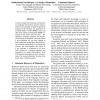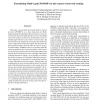528 search results - page 103 / 106 » Causal inference using the algorithmic Markov condition |
ML
2000
ACM
13 years 10 months ago
2000
ACM
The naive Bayesian classifier provides a simple and effective approach to classifier learning, but its attribute independence assumption is often violated in the real world. A numb...
ICDM
2006
IEEE
14 years 4 months ago
2006
IEEE
When monitoring sensory data (e.g., from a wearable device) the context oftentimes changes abruptly: people move from one situation (e.g., working quietly in their office) to ano...
ACL
2008
13 years 11 months ago
2008
Accurate unsupervised learning of phonemes of a language directly from speech is demonstrated via an algorithm for joint unsupervised learning of the topology and parameters of a ...
ATAL
2005
Springer
14 years 3 months ago
2005
Springer
Robust sequence prediction is an essential component of an intelligent agent acting in a dynamic world. We consider the case of near-future event prediction by an online learning ...
HICSS
2003
IEEE
14 years 3 months ago
2003
IEEE
This paper uses partially observable Markov decision processes (POMDP’s) as a basic framework for MultiAgent planning. We distinguish three perspectives: first one is that of a...


